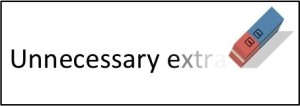by Anita Stratos, Proof Positive Editor
Did you trip over the title of this post? Did you have to read it twice? If so, that’s because both phrases, “superfluous verbiage” and “unnecessary words”, mean the same thing, but your mind was trying to discern a difference.
When you use extra words or duplicate a meaning in your writing, it can do a couple of different things: it can slow the action or forward movement of the story, and/or it can stop readers in their tracks while their minds backtrack over the repetition, searching for a missed meaning or misinterpretation. Neither is good.
Repetitions and extra verbiage slow stories down and can put the brakes on action scenes.
A few smaller examples we see frequently are:
“She took out her cell phone and dialed his number, then immediately hung up the phone.” The words “the phone” are superfluous because it’s already clear that the person was using a phone. Something like this may seem insignificant, but eliminating even the smallest unnecessary words tightens your writing and moves the story along faster. And in a story where there’s one superfluous phrase, chances are there are many more – add them up and you’ve got a lot of drag.
“His train was arriving at five o’clock p.m. in the evening.” When referring to a time after noon, “p.m.” is used, just like “a.m.” is used for morning. Therefore, using “in the evening” after “p.m.” is repetitious and can actually be annoying to some readers.
noon, “p.m.” is used, just like “a.m.” is used for morning. Therefore, using “in the evening” after “p.m.” is repetitious and can actually be annoying to some readers.
“He put his hat on his head as he walked out of her life forever.” “On his head” is extra verbiage because it’s assumed that’s where he’d put his hat – where else would it go? “He put on his hat as he walked out of her life forever” is smoother and has more impact without the unnecessary words.
Even more problematic, though, are entire phrases that essentially repeat what was just said without adding any new information.
“She tucked the letter into her pocket, secreting it away from prying eyes. It would be safe in her pocket where no one would see it.” If you see this type of repetition in your writing, choose whichever phrasing best fits the scene and keeps the action or tension going. Sometimes you may end up using the best of both worlds – a combination of the two: “She secreted the letter away in her pocket, where it would be safe from prying eyes.” No repetition, but plenty of information in a condensed and to-the-point way.
Tight writing moves faster and makes your points clearer, which readers always appreciate.
